- JULY 5
1872—The Republican Party National Convention takes place in Philadelphia with substantial representation from former Black slaves. At least three Blacks addressed the national political gathering. At this point in history, the Republicans were the nation’s most progressive party and attracted the allegiance of African Americans. Blacks would remain loyal to the Republicans until the 1930s. But by 1945 with the Republicans becoming increasingly conservative and attracted to the New Deal programs of Franklin D. Roosevelt, the vast majority of Blacks had switched to the Democrats.
1894—Black inventor G.W. Murray patents a fertilizer distributor, cotton chopper and a seed planter all on this day in 1894.
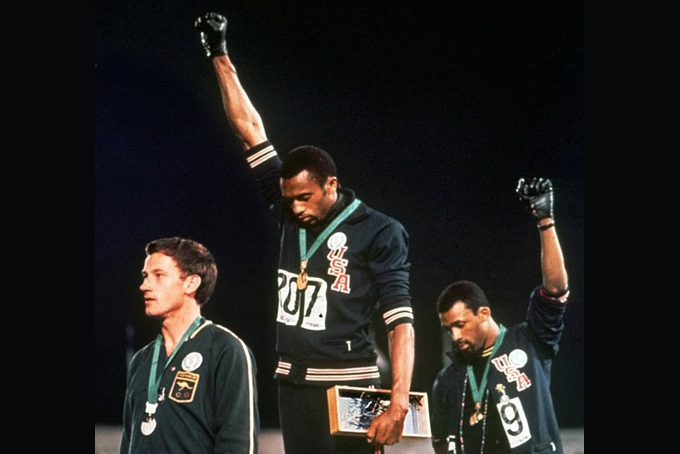
In this Oct. 16, 1968, file photo, Australian silver medalist Peter Norman, left, stands on the podium as Americans Tommie Smith, center, and John Carlos raise their gloved fists in a human rights protest. (AP Photo, File)
1945—Track star John Carlos is born in Harlem, N.Y. Carlos and fellow sprinter Tommie Smith created an international sensation when they protested American racism by giving the “Black Power” clinched fist salute when accepting their medals at the 1968 Olympics.
1956—Although the actual decision may have been reached the previous day, a federal district court hands down a ruling declaring that Alabama laws requiring racial segregation in public transportation were unconstitutional. The decision, which was later confirmed by the United States Supreme Court, was the first major legal victory for the Civil Rights Movement. It grew out of the historic Montgomery Bus Boycott sparked when Rosa Parks defied the law and custom by refusing to give up her seat on a public bus to a White man. Although actually organized by Rev. E.D. Nixon, the Boycott would result in Rev. Martin Luther King Jr. becoming the nation’s most prominent civil rights leader.
- July 6
1853—The first novel written by an African American is published on this day. However, the novel had to be published in England because the author William Wells Brown was a fugitive slave. The novel was entitled “Clotel” or “The President’s Daughter” and may have been partially inspired by the then rumored relationship between President Thomas Jefferson and the slave Sally Hemmings.
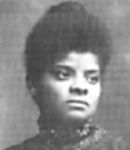
1862—One of the most pioneering and militant Black journalists in Black American history is born. Ida B. Wells-Barnett came into the world on this day in Holly Springs, Miss. The legendary journalist was also a relentless anti-lynching crusader and a fighter for women’s right to vote. She even made a stand against one of the more insulting laws of Jim Crow segregation nearly 70 years before Rosa Parks. In 1884, she refused to give up her seat on a train to a White man and move to an already over-crowded smoking car. It took the conductor and two other men to drag her off the train. She was among the group of Blacks and progressive Whites who helped establish the NAACP. When she was just 25 she established her lifelong attitude towards women being submissive to men declaring, “I will not begin at this late day by doing what my soul abhors: sugaring men, weak deceitful creatures, with flattery to retain them as escorts …” She died in Chicago in 1931.
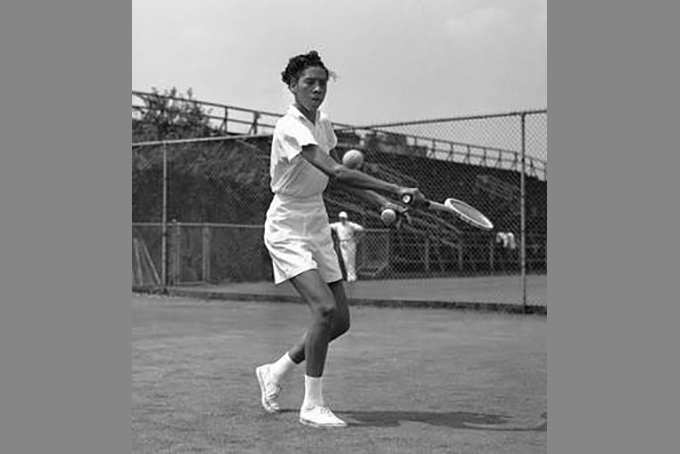
1957—Althea Gibson becomes the first Black person (male or female) to win the singles championship at Wimbledon. Gibson was born in Silver, S.C., and grew up in Harlem, N.Y. She died in September 2003. She often said she was driven to success in life by an attitude she developed during childhood. She summarized that attitude as “I always wanted to be somebody.”
1971—Henry T. Sampson invents the “gamma electric cell.” His invention and other engineering accomplishments had wide-ranging applications, but he did not invent the cell phone as some histories suggest. The gamma-electric cell converted nuclear radiation from reactors into electricity without going through the heat process.
- July 7
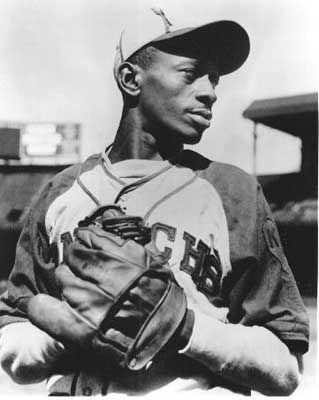
1906—Baseball legend Satchel Paige is born in Mobile, Ala. He was one of 15 children born to John and Lula Paige. Paige first learned to pitch in a reform school where he had been sent at the age of 12 for shoplifting. He spent most of his career playing in the old Negro Baseball Leagues prior to the integration of Major League Baseball. He is generally recognized as one of the greatest pitchers to ever play the game. Baseball great Joe DiMaggio once said Paige was “The best and fastest pitcher I ever faced.” Paige pitched his last game in 1965 at the age of 60 throwing three shutout innings. The great Satchel Paige died on June 8, 1982.
- July 8
1805—On this day in 1805, Bill Richmond becomes the first African-American to gain international fame as a boxer when he defeated Jack Holmes in a 26-round bout in England. The son of escaped slaves from Georgia, Richmond was born in New York City in 1763. He did most of his fighting in Europe. Near the end of his boxing career, he married a rich woman and retired. He died in London in December 1829.
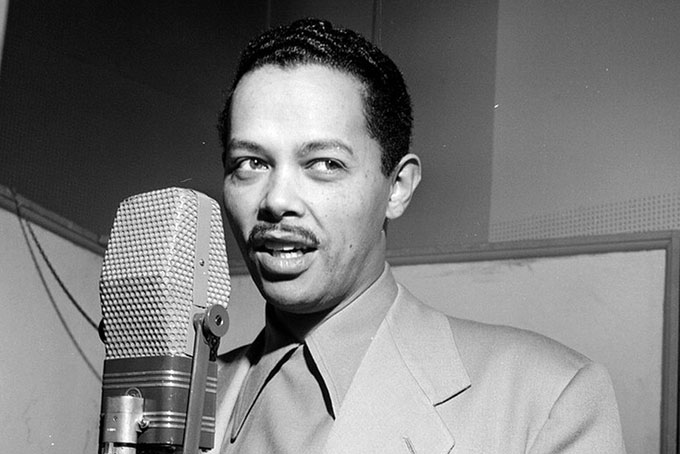
1914—Jazz great Billy Eckstine is born in Pittsburgh, Pa. He was raised in Washington, D.C., where he began entering talent competitions at the age of 7. Eckstine would become one of the dominant Jazz singers during the era of the big bands. He has been described as “an exceptional singer who never failed to impress.” Eckstine died of a heart attack in 1993.
- July 9
1863—Eight Black regiments play a major role as Union troops capture Port Hudson in Louisiana. They had laid siege to the Confederate fortress since May 23. The victory, along with the July 4 capture of Vicksburg, Miss., gave U.S. forces control of the Mississippi River, cut the Confederate army in half and laid the foundation for ending the Civil War. The Civil War would drag on for another two years but the Confederate troops fighting to maintain slavery were never able to recover from the loss of Port Hudson.
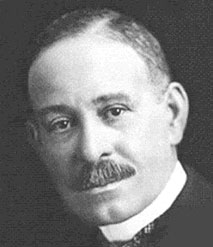
1893—Dr. Daniel Hale Williams performs the first successful open heart surgery in American history. He repaired a knife wound to the heart of one James Cornish. Cornish would go on to live for another 20 years. Williams established himself as one of the foremost African-American surgeons in the history of this nation. In addition to the surgery, his achievements were many. Born in 1856 in Hollidaysburg, Pa., he was appointed surgeon general of Freedman’s (now Howard University) Hospital in Washington, D.C. He taught at Meharry Medical College in Nashville, Tenn. He was a surgeon at Cook County Hospital in Chicago and he founded Provident Hospital in Chicago where he trained many of the nation’s early Black doctors and nurses. Williams also co-founded the predominantly Black National Medical Association.
2009—Reports first emerge suggesting that Haiti was beginning to conquer its HIV/AIDS epidemic. According to UNAIDS, the official AIDS infection rate on the poverty-ridden Caribbean island for people ages 15-49 was 2.2 percent—down from a high of nearly 8 percent in the 1980s. The decline was attributed to the closing of blood banks, where the poor sold their blood for money; the work of the Boston-based Partners in Health; and Haiti’s own GHESKIO clinic.
- July 10
1775—Shortly after taking command of the troops fighting for American independence from Britain, Gen. George Washington (the nation’s first president) has his adjutant general issue an order barring any further Blacks from joining the Continental Army. The decision would be confirmed by the Continental Congress in November of 1775. The fear was that Blacks who fought for America’s independence would be justified in demanding an end to slavery. And slave owners, including Washington, did not want that.
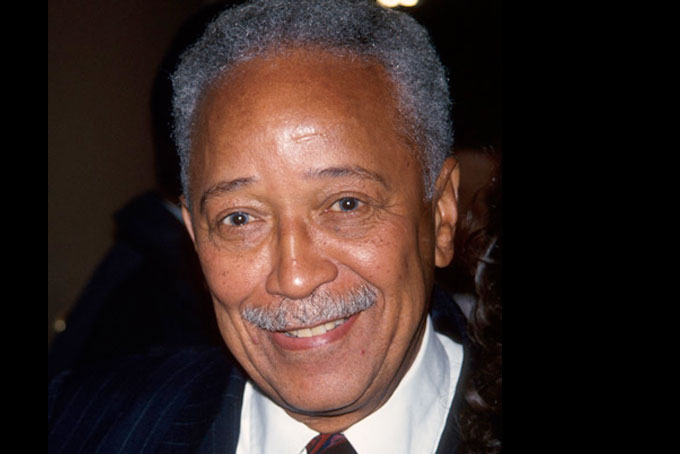
1927—David Dinkins, the first Black man elected mayor of New York City, is born on this day in 1927. He was born in Trenton, N.J., and served as New York City mayor from 1989 to 1993.

1943—Tennis sensation Arthur Ashe was born on this day in Richmond, Va. He would become the first Black male to win the Wimbledon men’s singles championship by defeating Jimmy Connors in 1975. Ashe would receive a contaminated blood transfusion and die of AIDS in February 1993.

1972—The Democratic Party holds its presidential convention in Miami, Fla. New York Congresswoman Shirley Chisholm, the first Black person to actively seek the party’s presidential nomination, received 152 votes on the first ballot. Senator George McGovern would eventually be nominated. Chisholm had been the first Black woman elected to the United States Congress, achieving the distinction in 1968. She was born in Brooklyn, N.Y., to a Barbadian mother and a Guyanese father. Chisholm’s signature phrase was “Un-bought and un-bossed.” She died in January 2005.
- July 11
1905—The Niagara Movement (forerunner of the NAACP) is founded during a meeting near Niagara Falls, N.Y. Among the most prominent Blacks at the meeting were intellectual and activist W.E.B. DuBois and newspaper publishers William Monroe Trotter and Ida B. Wells Barnett.
1915—Mifflin Wistar Gibbs dies. Gibbs had worked on the Underground Railroad helping Blacks escape from slavery along with Frederick Douglas. He would later become publisher of Mirror of the Times—the first Black newspaper in California. He was also the first African-American elected to a municipal judgeship in the state.
2010—Gospel legend Bishop Walter Hawkins dies. The Grammy award-winning Hawkins died at his home in Ripon, Calif. Hawkins was part of the influential Hawkins family. His brother was Edwin Hawkins and for a while he was married to gospel great Tramaine Hawkins.

